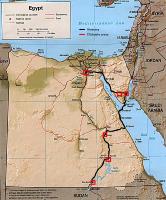 Clickable map with travel itinerary. Original map Courtesy of The General Libraries, The University of Texas at Austin.
Clickable map with travel itinerary. Original map Courtesy of The General Libraries, The University of Texas at Austin.
Travel Report on Egypt |
This travel report describes some of my personal impressions and experiences during a two weeks trip to Egypt in 1996. I haven't included much information about monuments, cities, history or about what to bring there in this report, as I think you can find more detailed and up to date information in good travel guides. You can also check out other websites about Egypt.
 Clickable map with travel itinerary. Original map Courtesy of The General Libraries, The University of Texas at Austin.
Clickable map with travel itinerary. Original map Courtesy of The General Libraries, The University of Texas at Austin.
First, here's a list of the Arabic words I had to use quite frequently:
Fortunately English is spoken and understood in all major tourist places. Nevertheless it's more polite and useful to know some basic Arabic words. It shows that you're willing to make an effort to communicate with locals, and it helps when you want to get rid of locals who want to sell you something. Unfortunately, that happens quite often. But in general Egyptian people are very friendly and helpful.
Don't forget to bring an international student card if you have one. Entrance fees are sometimes reduced up to 50%. Sometimes you might even get a better deal when bargaining if you can prove that you're a student. However, don't rely on it.
Going to Egypt also means thinking about security. It seems to be a problem in some places, as many policemen are walking or standing around with Kalashnikows in their hands. Travelling in rural areas is sometimes only possible in convoys, and some places are not accessible to tourists at all. Checkpoints are frequent. At least there are fewer tourists so that the monuments, museums and hotels are less overcrowded and cheaper. However, the situation is disastrous for the locals who depend on tourism. All that stuff about Islamic fundamentalism is a great pity. From what I know about Islam and from my discussions with several Muslims in different parts of the world I know that terrorism is certainly not part of this religion.
DAY 1 and 2: MARSEILLES ==> CAIRO My flight is scheduled at 7.15 a.m., that means I have to get up very early to be at the airport on time. As the flight is delayed, I still have the time to buy some alcohol and cigarettes. It's expensive and not easy to buy alcohol in Egypt (except beer and wine). Only foreigners are allowed to buy a limited amount of hard liquors in special shops, and they have to show their passport when doing so. I was approached three times by locals who wanted me to buy alcohol for them. They all pretended that their sister was going to get married soon, that they wanted to make a party and therefore needed some alcohol. It seems that there is a black market for hard liquors in Egypt.
Four hours after my departure from Marseilles I arrive at Cairo airport. The taxi to my hotel wants to charge twice the normal price (I asked a fellow Egyptian passenger about the price for a taxi ride into the city), so I have to haggle over the price. Finally I manage to pay only 10% more than usual and I feel that I still have to improve on that: Welcome to Egypt!
The 90 minutes ride to the hotel is impressing: people here drive like crazy, but it's fun; pedestrians, bikes, donkeys, camels, cars, lorries and buses on one lane or on all the lanes, regardless of the rest of the traffic. Overtake however and whenever you want, but don't forget to use your horn and your lights. No power to the police!
My hotel for the first night is located near the Pyramids of Giza. In the afternoon I visit the pyramids: it's not possible to walk five minutes and admire the scenery without anybody trying to sell you something: horse ride, camel ride, buy gems, take photo etc. After more than one hour I'm almost at the point to tell these guys that they can f*** their camels; nevertheless, I try to keep on smiling. Later, after two local beers while waiting for the light&sound show at the pyramids, I feel much better and admire the sunset. I see the show in Arabic. There is almost nobody, especially no tourists, around. It's wonderful and impressing. The same show in English is kitsch. I leave before it's over.
In the evening I go to the center of the city in order to look for another hotel. The hotels near the pyramids are high-standard, but not very well located. You can't go anywhere and the taxis to the center are overpriced. The next morning I move to my new hotel located in the city center. During the day I visit the Egyptian Museum and Al-Azhar & Khan al-Khalili (great bazaar) in Islamic Cairo. At the end of the day I feel that I only want to leave this city: too much traffic, too much hassle, too many people. Before going back to my hotel I sit down outside a cafe and smoke a shisha (waterpipe). Smoking a shisha is very relaxing and tastes good.
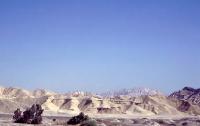 |
DAY 3 and 4: Mt SINAI In the early morning I leave for the Sinai and St. Catherine's Monastery. I bought a ticket for an air-con bus, but finally everybody is happy that the bus is driving at all. Inschallah! There is a hostel near the monastery where it's possible to stay overnight. Most of the guests are pilgrims or travelers, the atmosphere is very friendly. The monastery is located near Mt. Sinai where Moses received the Ten Commandments. Inside the monastery there is the burning bush where God spoke to Moses. Believe it or not.
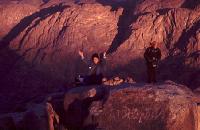 |
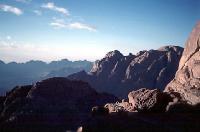 |
Getting up at 2.30 am to climb the Mt. Sinai and see the sunrise. As I'm lazy, I hire a Camel instead of walking. Camel riding is fun, I feel a little bit like on a ship. Fortunately I don't get seasick. Hundreds of people are walking up the mountain to see the sunrise. A group of members of the Korean Baptist Church is shouting "Hallelujah" and "Amen" all the time. Why can't they just be quiet and admire the wonderful stars of the Sinai desert?
Sunrise at 6am, it's getting so cold that I've got to put on a pullover. Some people take photos, others start praying. The peek of Mt. Sinai is the kind of place that makes you think about a lot of things. To climb down from the summit I take another route - the Steps of Repentance. 3000 steps laid by one monk as a form of penance. From this path you have a good view of the monastery. The monastery itself was built in the 4th century AC and is worth being visited.
In the afternoon I leave for Dahab, a beach resort next to the Red Sea. The road leads through the Sinai Desert. There are many different colors: yellow, red, green, black, grey,... the desert is amazing.
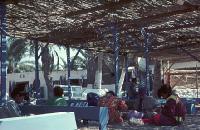 |
DAY 5 and 6: DAHAB (RED SEA) Hanging out in Dahab with two Australian girls I met. All I do is scubadiving, sunbathing, sleeping, relaxing, drinking, eating and partying. The restaurants don't have chairs, there are just small tables and pillows all over the ground. Mostly young people come here, it's really a good place to hang out for a while.
One of the reasons why I wanted to go to Dahab is scubadiving. A nightdive in the famous Red Sea is a wonderful thing to do: I just hear the sound of my own breath, it's so dark that I don't even see the surface anymore, just the lights of the other divers swimming next to me. The loneliness is almost perfect. I just hope that there are no sharks around.
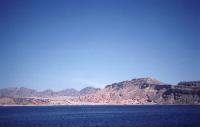 |
DAY 7: DAHAB ==> LUXOR I leave Dahab and take the ferry between Sharm el-Sheikh and Hurghada. The sea is calm, nice people on the boat. From time to time Dolphins join us and swim next to the boat for a while. After our arrival in Hurghada, we (7 people) try to find a taxi that has a licence and is willing to drive us to Luxor. It's important to check what kind of licence a taxi has, because some are only for local trips. We start our trip at 9pm and arrive in Luxor at 3am. Tourists are not allowed to travel in this area during the night. Our taxi driver takes a road foreigners are not supposed to take. The whole trip is perfectly illegal, but the driver gives some baksheesh to the policemen at the checkpoints in the rural areas. There are no major problems, except at the checkpoint in Luxor where the security people get very upset. The itinerary we took leads through areas where terrorists shoot at tourists. Maybe another time.
As usual, the friendly taxi driver brings you to an hotel he knows and where he gets commission. But at 3am nobody cares about that. I share a room with three other travelers, one Jordanian, one Canadian and one (strange) American.
DAY 8: LUXOR This city is several thousand years old. Temples, tombs... en masse. But today I only have time for the most important temples, as I intend to go to Aswan as soon as possible. The most important temples to visit are the Luxor Temple and the Temples of Karnak. The latter ones cover the area of a small town. Tens of thousands of people lived and worked here. God Amun (and others) were venerated at this place for more than 2000 years. Very impressing.
There should be a bus to Aswan running at 7 pm. That's at least what the official tourist information told me. At the bus station they tell me that the last 7 pm bus service to Aswan has been stopped one year ago, and that anyway I'm at the wrong bus station. I have to stay one more night in Luxor.
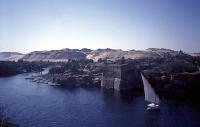 |
DAY 9: LUXOR ==> ASWAN The American guy and I decide to take the first Minibus to Aswan at 6 am. Squeezed with more than ten Bedouins in the bus, the three hours ride is not very comfortable, but interesting. In the afternoon I hang out in Aswan and try to find a nice hotel. Later I go on a Felucca trip on the Nile to see the sunset.
Aswan is a nice place to visit. The population here is mostly Nubian and not Arab, the mentality is different. There's less hassle than in other tourist places, and people seem to be not so stressed and even more friendly than in the rest of the country. Nubian women, if you have the opportunity to see some, are very pretty.
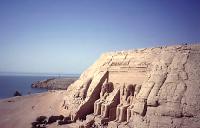 | 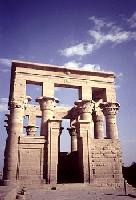 |
DAY 10: ABU SIMBEL Trip through the desert to Abu Simbel, more than 200km south of Aswan. We drive in convoy to go there. Checkpoints everywhere. Abu Simbel is very impressing, they moved the whole temple up a mountain before its original location disappeared in the waters of Lake Nasser. On the way back we stop at Philae Island, a charming place with temples from different periods of history (Egyptian, Greek, Roman,...).
Later in the afternoon I go on a Felucca trip with the Canadian and the Jordanian guys I already met in Luxor. The three of us and two Nubian sailors stay for about four hours on the boat, drinking beer and whiskey, smoking a shisha, watching the sunset and the lights of the city, relaxing and discussing. It's just wonderful.
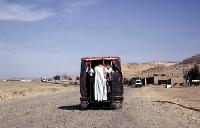 |
DAY 11: ASWAN Visit of the Tombs of the Nobles. I'm the only tourist here. I have my personal guide, an old Bedouin. It's very common in Egypt for men to walk hand in hand, and it doesn't mean anything (I think so), but I nevertheless feel quite uncomfortable when the guide takes me by the hand, first to show me the tombs, then to show me where he sleeps.
The Old Cataract Hotel, one of the most famous hotels in Egypt (and in the world?) is a nice place to see the sunset. This hotel is build in a Moorish style and has terraces with a wonderful view on the Nile and the desert. Unfortunately they don't know how to mix good cocktails, my Daiquiri is not very good, but the nice atmosphere compensates for it.
At the Nubian market it's possible to find the usual tourist souvenirs as well as some more special things coming from the black heart of Africa, for example crocodile feet. I think it's forbidden to bring back such 'souvenirs' to France or Germany.
DAY 12: ASWAN ==> LUXOR I hire a taxi for the ride back to Luxor so that I can stop during the trip in order to visit some temples (Kom Ombo and Edfu). During my last two days in Egypt I decide to stay in a three star hotel in Luxor. From my room I have a good view on the Nile and on the Temple of Luxor. The roof terrace offers an even better view. The room rate is reasonable, only 35USD per night for a single room with bath and hot water. The name of the place is Mina Palace Hotel, and the room with the best view is 406; it's a double room. In the evening I go to the Luxor Museum which is worth being visited. Later I meet some fellow travelers I already saw in Aswan, we have dinner and hang out together for a while.
DAY 13: LUXOR Organized tour to the monuments and tombs in Theben West, on the other side of the Nile (Valley of the Kings etc.). After the tour, I spend most of the afternoon trying to find the travel agency where I am supposed to reconfirm my flight. They moved without telling their new address to their colleagues in France.
DAY 14: LUXOR ==> MARSEILLES My last (and longest) day in Egypt. I go back to Theben West in the morning to see the tomb of Nefertari in the Valley of the Queens which I couldn't visit the day before. It's not the biggest tomb, but the most beautiful one. Only 100 visitors per day are allowed to visit this tomb. I think it's worth going there, although it's very expensive.
In the afternoon, the ultimate stress: buying a souvenir. I'm looking for a nice shisha, and a not too expensive one. After searching for four hours (including 90 minutes bargaining) I have what I want. The problem was that I forgot that a lot of shops are closed in Egypt on Fridays.
My flight back to Marseilles is scheduled at 2am, but it only takes off at 3am. I arrive in Marseilles at 7am. It's quite cold and it rains. I just want to sleep...
Egypt is definitely worth a trip, as well for its well known historical and cultural sites as for the beauty of the Sinai Desert and the Red Sea coast. Most Egyptians are friendly and helpful, although there's sometimes a lot of hassle at tourist places. Security is a cause for concern, but I never felt threatened or not welcome.
You need at least two weeks in order to see the most important places and to relax from time to time. I think three weeks would be ideal for individual travelling, depending on your priorities. Travelling in Egypt is not expensive, too. The whole trip, including the flight, cost me about 1400USD, and I didn't really travel on low-budget, although I always bargained. I was also lucky concerning diseases, as I had absolutely no problems with my stomach. All I had was a cold. I suggest to go to Egypt during low-season and not in the summer, as it's too hot then.
Some links
NOTE:
I don't maintain or update this page any more, and you can't access it from my other pages. It's still here because some search engines or sites link to it. The rest of my site is a photo exhibit without any narratives.
Please be fair and respect the copyright.
Contact me if you want to use any of the pics or if you have a specific question concerning the photos.
For any comments about my photos please sign my guestbook. Your (positive or negative) feedback is very welcome!
| New York | Venice | Vietnam | Egypt | |
| Home | Contact | Guestbook | Copyright | Sitemap |
 pageviews since October 12, 1998.
pageviews since October 12, 1998.
© Stephan Edelbroich
Disclaimer